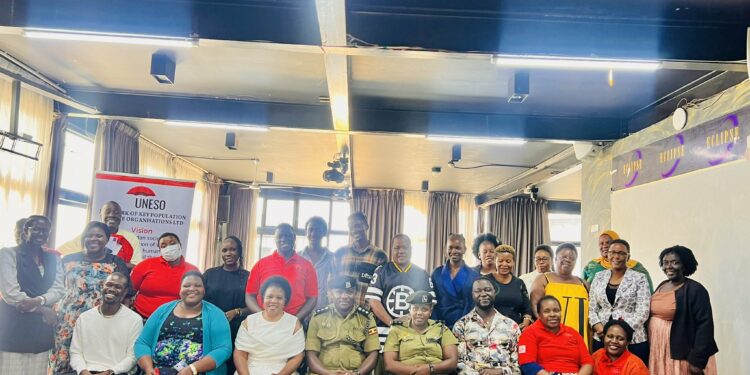The sex workers movement, under the Network of Key Population Service Organisations (UNESO), has called on the government to repeal laws and policies that criminalize sex work. The group emphasized that decriminalization is essential for protecting sex workers from violence, exploitation, and discrimination.
This appeal was made during the commemoration of the International Day to End Violence Against Sex Workers, held under the theme “End Violence Against Sex Workers.” The event, initiated by the Global Network of Sex Worker Projects, serves as a platform to condemn hate crimes targeting sex workers, honour victims of violence and advocate for justice for those who have suffered abuse or lost their lives over the years.
In a joint statement, Uganda’s sex worker movement expressed deep concern over the increasing violence and killings targeting sex workers across the country. They pointed out that criminalization exacerbates their vulnerability, forcing them to operate underground and denying them access to legal protections.
One representative remarked during the commemoration, “Sex workers deserve to live free from violence and discrimination. Criminalizing sex work only fuels stigma, increases risks of abuse, and prevents us from seeking justice when attacked.”
The movement stressed that an enabling legal environment is necessary to prioritize the health, safety, and human rights of sex workers. They called for legal reforms to improve access to healthcare, justice, and economic empowerment while reducing harassment and exploitation by law enforcement and other actors.
“Decriminalization will not only protect sex workers but also create pathways for them to access legal protection and report violence without fear of arrest,” another activist added.
The sex workers also condemned ongoing mistreatment by junior police officers, local council defense units, LC1 chairpersons, and army personnel, who often regard them as immoral members of society. They urged senior police officials to sensitize their ranks to recognize the inherent human rights of sex workers.
In response, Afande Lameck Kigozi emphasized the need for legislation to legalize sex work in Uganda. He noted that confrontations between sex workers and authorities would persist as long as the industry remains illegal. He urged stakeholders to take necessary steps toward addressing the issue and pledged police efforts to reduce conflicts.
“We need legislation to legalize this kind of business in our country. Without clear laws, confrontations will always be there. There is a lot to be done, but it must be done within the framework of the law. If things remain as they are, conflicts will continue, although we will try to minimize them,” Kigozi stated.
He also encouraged sex workers to confidently report any rights violations to police authorities, especially Community Liaison Officers (CLOs).
Stella Nassuuna, Advocacy Officer at UNESO, called for policy reforms to eliminate clauses in existing laws that target vulnerable communities, including sex workers. She urged for consultation with affected groups before enacting new laws.
“Yes, there are great policies in Uganda, like the Sexual Offenses Bill, which protects women’s rights in diversity. However, some clauses are problematic and disproportionately target vulnerable communities like sex workers. We need to review policies critically to ensure no one is left behind. Laws should protect every Ugandan, not favour one group over another,” Nassuuna said.
She also encouraged sex work organizations and other CSO partners to unite in advocating for the rights of sex workers and other vulnerable populations. Additionally, she urged CSOs to collect data for evidence-based advocacy, noting that such evidence is crucial for driving change and holding perpetrators accountable.
Lindah Alice Nambalirwa, a human rights defender from the Human Rights Awareness and Promotion Forum (HRAPF), called on stakeholders to raise awareness among rural sex workers about their rights. She also urged police leadership to educate officers on the rights of sex workers, highlighting that many officers are unaware of these rights.
The 2023–2024 UNESO Human Rights Situation Report provides an in-depth analysis of systemic abuses endured by sex workers across Uganda. It documented 237 cases, with 214 verified as human rights violations, including torture, discrimination, property violations, and breaches of the right to life.
Do you have a story in your community or an opinion to share with us: Email us at editorial@watchdoguganda.com













